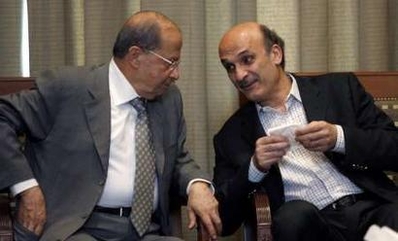Change and Reform bloc chief MP Michel Aoun and Lebanese Forces leader Samir Geagea announced Wednesday that their parliamentary blocs will take part in controversial legislative session scheduled for Thursday and Friday after a political “settlement” was reached over the controversial issues.
“Today is a happy day. All disputes over the agenda of tomorrow’s parliamentary session have been resolved and a comprehensive agreement has been reached over them – the nationality law, the municipalities law, the electoral law and other minor issues,” Aoun declared at a press conference.
“We will attend tomorrow’s session to approve the proposed draft laws, especially those related to international agreements and loans,” Aoun added.
“Congratulations to the Lebanese and we hope there will always be cooperation,” he said.
Aoun’s announcement came shortly after Change and Reform bloc secretary MP Ibrahim Kanaan visited Speaker Nabih Berri in Ain al-Tineh.
Meanwhile, Lebanese Forces leader Samir Geagea congratulated the Lebanese people over the settlement that was reached, hailing “the cooperation between the LF and the Free Patriotic Movement.”
“Former premier Saad Hariri rescued the situation through the agreement that was reached between us and the Future movement after the agreement between us and the FPM,” Geagea said, lauding Hariri over his stance.
“We held contacts with the FPM and the rest of the blocs to put the renaturalization law and the electoral law on the agenda,” he said.
“From the very first moment, we did not have a problem with the financial issues, the problem was in the electoral and nationality laws,” Geagea pointed out.
Noting that “national partnership comes before anything else,” the LF leader declared that the day “witnessed a victory for everyone.”
Earlier, Hariri announced that the Future movement will take part in the legislative session due to the pressing nature of the financial draft laws, vowing that “after Thursday’s session, the movement will not attend any legislative session that will not be aimed at addressing the parliamentary electoral draft-law.”
Later on Wednesday, Aoun and Geagea telephoned Maronite Patriarch Beshara al-Rahi to “brief him on the outcome of the consultations that were made over tomorrow’s legislative session,” National News Agency said.
Their delegates — MP Kanaan and LF media officer Melhem Riachi — also visited the patriarch to “put him in the picture of the latest developments regarding the legislative session.”
Earlier, lawmakers who met with Berri asserted that the session will be held “because there are pressing financial issues that need to be addressed.”
Tensions had peaked between Christian parties who had threatened to boycott the legislative session and other political blocs who announced that they will attend it, raising fears over its potential postponement.
Berri had justified his decision to exclude the draft electoral law from the legislative session’s agenda, saying that this issue “needs a national agreement that does not exist.”
The legislative session is scheduled for Thursday and Friday.
The Christian blocs of the LF and the FPM had warned that they would not attend the meeting over the failure to include the electoral draft-law on the agenda.
The Phalange Party has announced that it will not attend the session due to the ongoing presidential vacuum.
The Lebanese parliament failed again today and for the 31st time in a row to elect a president to replace Michel Suleiman whose term ended on May 25 last year.
As in the past sessions the parliament was unable to reach a quorum because the Iranian-backed Hezbollah militant group and its ally Aoun’s Change and Reform bloc MPs boycotted the session.
Jumblatt welcomes FPM/LF deal
Progressive Socialist Party leader MP Walid Jumblatt hailed Wednesday the political settlement that was reached over the legislative session, hoping it will push political parties to address all problems through “serious and honest dialogue.”
“In the past few days, Lebanon went through a major political crisis that was about to jeopardize stability and the country’s foundations amid sharp disputes and contradictions,” Jumblatt noted.
“An agreement has been reached on the participation of most parliamentary blocs in the legislative session scheduled for Thursday and Friday and this is a very positive development,” he added.
Jumblatt said he is pinning great hopes that the settlement will “lead to a new chapter among the Lebanese political parties so that we can address all our problems through serious and honest dialogue.”
“We cannot but thank and salute all those who exerted efforts to reach this settlement and who resorted to wisdom and rationality and put the Lebanese interest before anything else,” Jumblatt added.
Hezbollah urges ‘settlement’ on presidency, govt., electoral law
Hezbollah chief Hassan Nasrallah called Wednesday for a “comprehensive political settlement” over the issues of the stalled presidential vote, the next government and the electoral law .
“I call on the political forces to seek a real political settlement,” said Nasrallah in a televised address marking Hezbollah ‘s “Martyr Day”.
“Let us engage in bilateral, tripartite or four-party talks to discuss the issues of the presidency, the premier, the government’s structure and the electoral law,” he urged.
“The electoral law is the main factor in the formation of authorities and the fate of the country depends on it,” Nasrallah said
Commenting on the latest controversy regarding the legislative session that will be held on Thursday and Friday, Nasrallah decried that “the situations that we have reached in Lebanon reflect an evasion of responsibility.”
“The parties are trading barbs and awaiting the instructions of foreign forces,” he said.
“Every person started interpreting the Constitution in their own way and after a long absence, a call was made for a legislative session to address a number of pressing issues and the country plunged into a contentious debate,” Nasrallah added.
He however stressed that all parties must attend the session because it has to do with “the country’s national interest.”


Leave a Reply
You must be logged in to post a comment.